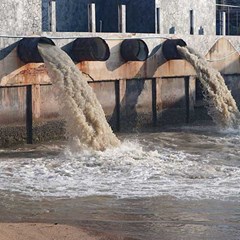Secret Strategies in Hazardous Waste Water Therapy Processes
The treatment of industrial wastewater is an essential aspect of environmental administration, including a range of strategies designed to mitigate the effect of pollutants. Innovations in technologies such as membrane filtration and advanced oxidation processes provide ingenious options for improving therapy effectiveness.
Physical Therapy Approaches
Just how properly can physical therapy approaches attend to the intricacies of commercial wastewater? Physical therapy techniques play an essential function in the preliminary stages of wastewater management, focusing primarily on the elimination of solids and huge particulates. Strategies such as flotation protection, filtering, and sedimentation are necessary for lowering the focus of suspended solids, therefore improving the efficiency of subsequent therapy processes.
Sedimentation includes the gravitational settling of solids, permitting for the splitting up of much heavier products from the wastewater. This method is especially reliable in making clear water prior to chemical or biological therapies.
In addition, flotation methods, which use air bubbles to raise suspended solids to the surface area for removal, work in treating wastewater with high concentrations of fats, oils, and oils. Overall, physical therapy techniques work as a critical initial step in the comprehensive management of commercial wastewater, guaranteeing that the lots on subsequent therapy phases is reduced and boosting overall treatment efficiency.
Chemical Treatment Strategies
While physical treatment methods prepared for reliable wastewater administration, chemical treatment strategies are crucial for addressing the extra complicated contaminants commonly located in industrial effluents. These approaches use various chemical representatives to precipitate, counteract, or oxidize damaging substances, making sure a more thorough removal of toxins.
One typical strategy is coagulation and flocculation, where chemical coagulants such as aluminum sulfate or ferric chloride are contributed to advertise the aggregation of put on hold particles. This procedure boosts solid-liquid separation, minimizing turbidity and improving water high quality. In addition, neutralization processes are utilized to readjust the pH of wastewater, using acids or bases to counteract acidic or alkaline streams, respectively.
Oxidation-reduction reactions play a crucial function in derogatory natural contaminants and microorganisms. Chemical oxidants like chlorine, ozone, or hydrogen peroxide are used to damage down intricate natural compounds, making them less damaging or more biodegradable. Advanced oxidation processes (AOPs) integrate several oxidation strategies to boost toxin elimination performance.
Organic Treatment Processes
The efficiency of wastewater treatment is substantially boosted by organic therapy procedures, which harness the natural metabolic activities of bacteria to disintegrate natural issue and remove contaminants. Industrial Waste Water Treatment. These processes mainly involve aerobic and anaerobic food digestion, each customized for certain kinds of wastewater
Cardiovascular treatment processes make use of oxygen to sustain microbial development, promoting the break down of organic toxins right into co2 and water. Typical methods consist of turned on sludge systems, where oygenation storage tanks facilitate the blending of wastewater with microbes, and dripping filters, which encourage biofilm growth on media surface areas.
On the other hand, anaerobic treatment procedures happen in the absence of oxygen, making use of anaerobic germs to break down organic issue, resulting in biogas manufacturing, an eco-friendly energy resource. Anaerobic digesters are commonly utilized in commercial settings for this purpose, effectively reducing the quantity of sludge while producing beneficial biogas.
The option of an organic therapy method depends upon wastewater features, therapy goals, and regulatory standards. The assimilation of biological procedures in wastewater therapy not just enhances pollutant page elimination performance yet likewise promotes sustainability by reducing chemical usage and sustaining resource recuperation.
Advanced Oxidation Processes

Typical AOP methods consist of Fenton's photocatalysis, reagent, and ozonation. Fenton's reagent, a combination of hydrogen peroxide and ferrous iron, militarizes the development of hydroxyl radicals, making it efficient for treating wastewater consisting of phenolic compounds and other stubborn substances. Ozonation uses ozone as an effective oxidant, with the ability of weakening a variety of organic contaminants while all at once sanitizing the effluent. Photocatalysis uses light-activated drivers, such as titanium dioxide, to boost oxidation reactions and remove contaminants.
AOPs offer numerous benefits, including find out here lowered sludge production and the capability to treat wastewater with high focus of natural toxins. The execution of AOPs requires cautious consideration of functional parameters and cost-effectiveness, making certain that these innovative methods are suitably integrated right into existing wastewater treatment systems.
Membrane Layer Purification Technologies

Microfiltration is effective for eliminating suspended bacteria and solids, while ultrafiltration targets smaller sized natural molecules and viruses. Nanofiltration links the gap between ultrafiltration and turn around osmosis, properly eliminating natural compounds and divalent ions. Reverse osmosis gives the highest possible level of filtration, utilized largely for desalination and removing mono-valent ions.
Membrane technologies use many advantages, consisting of reduced energy intake compared to traditional therapy methods, modular design for scalability, and the capacity for water healing and reuse. Obstacles such as membrane fouling and the requirement for routine upkeep need to be dealt with to make certain system efficacy. Generally, membrane filtering innovations stand for an essential component of contemporary industrial wastewater treatment strategies, promoting sustainability and resource preservation in water management.
Final Thought
In final thought, commercial wastewater therapy employs a diverse array of strategies, including physical, chemical, organic, and advanced approaches. Proceeded improvements in these methodologies will additionally boost the performance and performance of wastewater treatment procedures in industrial settings.
The treatment of industrial wastewater is a vital facet of environmental administration, involving an array of strategies developed to mitigate the impact of pollutants.Just how effectively can physical therapy techniques attend to see here now the intricacies of commercial wastewater?Advanced oxidation procedures (AOPs) represent an advanced method in industrial wastewater treatment, developed to properly weaken natural toxins that are frequently immune to standard treatment approaches (Industrial Waste Water Treatment).In final thought, commercial wastewater treatment uses a varied variety of methods, including physical, chemical, organic, and progressed methods. Proceeded improvements in these methodologies will even more boost the effectiveness and performance of wastewater treatment processes in industrial settings
Comments on “Industrial Waste Water Treatment-- Industrial-Grade Water Filtration and Filtration Solutions”